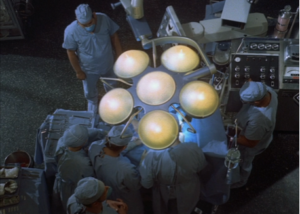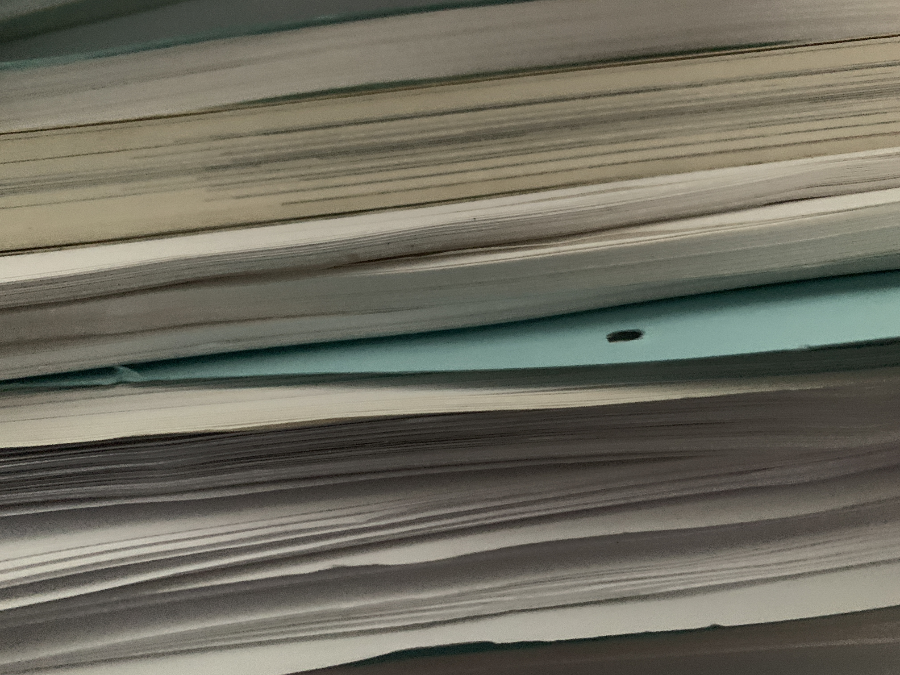I have a ridiculously good memory for places. I can boast about this to you because it is of no earthly value. Well, recently it helped me remember where a specific shot was in some video footage that I needed, so that’s nice. But for you, useless. I can’t direct you to a place, I can just know what it looked like.
It’s how I can close my eyes and take a walk around BBC Television Centre, or BBC Pebble Mill, or BBC Woodlands. Now I think of it, nearly every BBC building I’ve ever worked in has been demolished.
Well.
Okay, an equally useless example for you, but one that made me happy. The other night, I was watching a 1973 episode of Columbo called A Stitch in Crime by Shirl Hendryx. And I recognised a place. More than a place, I recognised a specific camera shot of the place. Recognised it and knew where I knew it from.
On the top, Columbo in 1973. On the bottom, a still from the title sequence of 1976’s The Six Million Dollar Man. Tell me you’re not impressed. Don’t tell me that this is pointless and useless, tell me you’re not impressed.
But this ability to precisely recall shots and angles and places is frustrating me this week. I do this quite often, but for many reasons I have this week been trying to remember exactly where there is not a coffee shop in Birmingham New Street Station. Not a coffee shop.
I could make a crack about how the place is now wall to wall coffee establishments, and of course just like you I could make a comment about long it has been since any of us have been out for coffee.
But the thing with this particular precise and impossible memory is that the coffee shop I’m thinking of used to be there. It was there before New Street was so radically transformed that the very bones of its geography seem different. I can see every step of what was its nearest entrance, I can see the shop – it was a freestanding stall with seats, really – and I can actually see a lot more.
I can see the specific seat and table I sat at. I can see the man I sat with and even the case by his left foot.
But while I do regularly try, I can’t map that precise memory onto where it would have been in the new Birmingham New Street.
And I really do try. Because for all the BBC places, all the magazines and all the websites, and the fact that at the time I was doing Doctor Who radio dramas and my first book was an inch away from coming out, a conversation I had there in 2012 is the most important one in my writing career.
It was a horrible time, actually. While I’ve been a full time freelance writer since the mid-1990s, from about 1999 to 2012, I’d been increasingly working for different parts of the BBC. It was always different parts, different departments across BBC News, the Corporation in general and BBC Worldwide, the commercial side of the BBC. Even within these, there would be variation. So I wrote a lot for Radio Times magazine, but I separately wrote a lot for the Radio Times website.
And in one of the BBC’s many times when it has to be seen to be saving money, I lost that freelance Radio Times website work but you couldn’t tell because they put me on staff instead. Only for one, two, four days a week at different times, but officially I was staff for that site. And still freelancing for the Radio Times magazine, BBC News, all of that.
In my head, I was still a freelancer. So when I tell you that I’ve spent thirty years doing this, I am not lying, but my accountant would wiggle his hand a little about the patch from 1999 to 2012. And unfortunately, even as my head tells me I was freelance, my head apparently forgot.
I forgot to be always looking for the next gig. I forgot that freelance work, no matter what way they choose to spell the word freelance, is always going to vanish.
So in 2012 when the BBC had another time that it had to be seen to save money and for once actually did, I lost all that Radio Times work completely. All of it. In one go. The BBC News work had dribbled away, too, and I hadn’t minded because at RT I was usually doing the equivalent of eight days work a week.
I think it was May 2012, I’m pleased to say that I’m no longer sure what month it was. But I lost it all very quickly and it was frightening.
Cue the conversation.
I wish I could remember how I found Writing West Midlands, I cannot pin down the route from living in Birmingham and finding them. Not in this way, not for this. I was aware of them from the Birmingham Literature Festival that they run. But in some way, I made contact, not even really sure why I was asking and what I was asking.
Jonathan Davidson of Writing West Midlands told me. He told me at that coffee stall in New Street Station extremely early one morning in 2012. Sized me up, asked me questions, made some suggestions, made some recommendations. The one I remember most distinctly was that he decided I’d be good at going into schools. “I’d like that,” I lied. Visiting a school seemed up there with weekly fitness classes at my dentist, but I wasn’t going to admit that.
I’ve just checked. Since that conversation, I’ve done 70 sessions in schools across the UK. I blame him.
That’s one of the many concrete suggestions he had, but I remember all of this because it was the start of rebuilding my confidence as a writer. I mean, I’m a writer, we don’t know from confidence, but I also hadn’t realised just how stripped back mine had become because of losing the BBC work. I thought I was low, I think now that I was much lower.
So usually I remember this because of how much better things are for me now as a writer. It’s still not a wine and roses kind of job, but I’m writing full time even during the lockdown and – I think – I’m writing the best I ever have.
The reasons that I’m particularly thinking of this today, though, are, well, many. Last night I finished writing a play that Jonathan has been encouraging me to do for more than a year. And also last night a friend told me he’d just had a meeting with him and that something in the meeting had reminded Jonathan of his one with mine all those years ago.
And I’m thinking of it because Jonathan Davidson will always get you writing, forever help you out with practical advice, and never mention that he writes too.
Well, bollocks to that. The man has a new book coming out and he’s promoting it with some deeply absorbing blog posts on his website. Here’s the site, here’s the new book. Go step inside the head of a man I owe.


